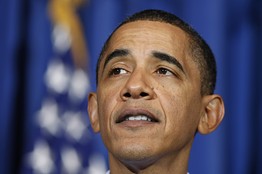Unserious About Iran
Obama is acting as if he believes a nuclear Tehran is inevitable.
WSJ.com
'Our aim is not incremental sanctions, but sanctions that will bite." Thus did Secretary of State Hillary Clinton seek to reassure the crowd at the American Israel Public Affairs Committee two weeks ago about the Obama Administration's resolve on Iran. Three days later, this newspaper reported on its front page that "the U.S. has backed away from pursuing a number of tough measures against Iran" in order to win Russian and Chinese support for one more U.N. sanctions resolution.
This fits the pattern we have seen across the 14 months of the Obama Presidency. Mrs. Clinton called a nuclear-armed Iran "unacceptable" no fewer than four times in a single paragraph in her AIPAC speech. But why should the Iranians believe her? President Obama set a number of deadlines last year for a negotiated settlement of Iran's nuclear file, all of which Tehran ignored, and then Mr. Obama ignored them too.
In his latest Persian New Year message to Iran, Mr. Obama made the deadline-waiver permanent, saying "our offer of comprehensive diplomatic contacts and dialogue stands." Mahmoud Ahmadinejad had a quick rejoinder. "They say they have extended a hand to Iran," the Iranian President said Saturday, "but the Iranian government and nation declined to welcome that."
The Iranians have good reason to think they have little to lose from continued defiance. Tehran's nuclear negotiator emerged from two days of talks in Beijing on Friday saying, "We agreed, sanctions as a tool have already lost their effectiveness." He has a point.
The Chinese have indicated that the most they are prepared to support are narrow sanctions on Iran's nuclear program of the type Tehran has already sneered at. As the Journal's Peter Fritsch and David Crawford reported this weekend, the Iranians continue to acquire key nuclear components from unsuspecting Western companies via intermediaries, including some Chinese firms.
Yet the Administration still rolls the sanctions rock up the U.N. hill, in a fantastic belief that Russian and Chinese support is vital even if the price is sanctions that are toothless. French President Nicolas Sarkozy urged Mr. Obama a year ago to move ahead with sanctions even without the Russians and Chinese, but Mr. Obama insisted he needed both. A year later, everyone except apparently Mr. Obama can see who was right.
The Administration also argued upon taking office that by making good-faith offers to Iran last year, the U.S. would gain the diplomatic capital needed to steel the world for a tougher approach. Yet a year later the U.S. finds itself begging for U.N. Security Council votes even from such nonpermanent members as Brazil and Turkey, both of which have noticeably improved their ties with Iran in recent months.
The U.S. can at this point do more unilaterally by imposing and enforcing sanctions on companies that do business in Iran's energy industry. But so far the Administration has shown considerably less enthusiasm for these measures than has even a Democratic Congress.
As for the potential threat of military strikes to assist diplomacy, Defense Secretary Robert Gates has made his doubts about their efficacy very public. The President's two-week public attempt to humiliate Benjamin Netanyahu has also considerably lessened the perceived likelihood of an Israeli strike on Iran, thereby further diminishing whatever momentum remains for strong sanctions.
All of these actions suggest to us that Mr. Obama has concluded that a nuclear Iran is inevitable, even if he can't or won't admit it publicly. Last year Mrs. Clinton floated the idea of expanding the U.S. nuclear umbrella to the entire Middle East if Iran does get the bomb. She quickly backtracked, but many viewed that as an Obama-ian slip.
Most of the U.S. and European foreign policy establishment has already concluded that Iran will succeed, and the current issue of Foreign Affairs makes the public case for what to do "After Iran Gets the Bomb." Authors James Lindsay and Ray Takeyh argue that a nuclear Iran is containable, and that it is better than the alternative of a pre-emptive U.S. attack on Iran's nuclear facilities.
However, even they acknowledge that a nuclear Iran "would be seen as a major diplomatic defeat for the United States," in which "friends would respond by distancing themselves from Washington [and] foes would challenge U.S. policies more aggressively." And that's the optimistic scenario.
Meanwhile, the CIA has recently reported that Iran more than tripled its stockpile of low-enriched uranium in 2009; that it has "[moved] toward self-sufficiency in the production of ballistic missiles"; and that it "continues to develop a range of capabilities that could be applied to producing nuclear weapons." A senior Western official recently told us he is confident the Iranians either have or are building secret nuclear facilities beyond the one near Qom that was disclosed last year.
President George W. Bush will share responsibility for a nuclear Iran given
his own failure to act more firmly against the Islamic Republic or to allow
Israel to do so, thereby failing to make good on his pledge not to allow the
world's most dangerous regimes to get the world's most dangerous weapons. But it
is now Mr. Obama's watch, and for a year he has behaved like a President who
would rather live with a nuclear Iran than do what it takes to stop it.
